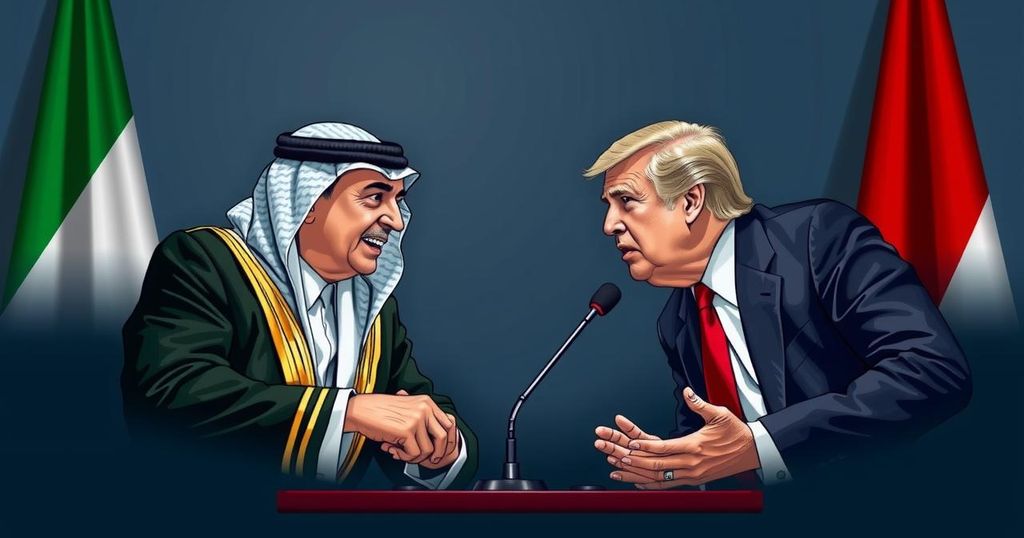Recent dialogues between the United States and the UAE could lead to the lifting of sanctions on Syrian President Bashar al-Assad, contingent on his distancing from Iran and cessation of arms supplies to Hezbollah. These discussions are influenced by upcoming sanctions expirations and changes in regional power dynamics following recent rebel advances in Syria.
Recently, discussions between the United States and the United Arab Emirates (UAE) have emerged regarding the possible easing of sanctions on Syrian President Bashar al-Assad. These talks center on the condition that Assad distance himself from Iran and terminate arms supplies to Hezbollah in Lebanon. The conversations, which are reported to have intensified recently, may be influenced by the potential expiration of U.S. sanctions on Syria on December 20. Previous efforts to rehabilitate Assad amid regional tensions, particularly with respect to Iran and Israel’s interventions, illustrate the complexity of these diplomatic maneuvers.
The United States and UAE are capitalizing on the current geopolitical landscape, particularly following the recent rebel advances in Aleppo, which highlight vulnerabilities within Assad’s regime and its alignment with Iran. Contacts among party representatives indicate a strategic effort to drive a wedge between Assad and Iran, which has been critically supportive of his regime during civil unrest. However, Iranian officials have expressed their concern over these diplomatic overtures, and recent engagements suggest a desire to maintain their influential relationship.
Key contextual factors include Iran’s historical support for Assad’s rule during Syria’s civil war, and ongoing tensions involving Hezbollah. As Hezbollah perceives involvement in southern Lebanon more pressing, Israel continues to target Iranian-associated assets in Syria, thereby altering the battlefield landscape. The UAE’s role as a mediator in this context seeks to re-establish Assad among Arab nations, particularly as they pursue business opportunities with Syria against a backdrop of U.S. sanctions targeting the Assad regime.
Iranian Foreign Minister Abbas Araqchi’s recent visit to Syria signifies Tehran’s ongoing commitment to Assad, reinforcing their partnership amid these unfolding diplomatic dynamics. U.S. sources have indicated that if Assad exhibits willingness to disengage from Iran, it may open avenues for reconstruction assistance, contingent upon U.S. sanctions being lifted. The potential expiration of the stringent Caesar sanctions presents a timely opportunity for the UAE and the U.S. to sway Assad’s affiliations.
In summation, the U.S. and UAE’s diplomatic engagement with Assad illustrates a pivotal moment in Middle Eastern geopolitics, underpinned by evolving allegiances and strategic interests. The proposed sanctions relief tied to a recalibrated relationship with Iran could significantly reshape the power dynamics in the region, albeit amidst considerable risks pertaining to Assad’s commitments to his traditional allies.
The discussions regarding U.S. sanctions on Syria revolve around the Assad regime’s historical reliance on Iran, particularly during the Syrian civil war that began in 2011. Iranian support has enabled Assad to regain control over substantial territories, leading to a complex but mutually beneficial alliance. Recent developments suggest that regional dynamics, particularly Israel’s military actions against Iranian positions and the shifting strategies of fallen rebel factions, may present opportunities for other nations to redefine their relationships with Syria, particularly the UAE, which aims to reintegrate Assad into the Arab fold.
The conversations between the U.S. and the UAE regarding sanctions relief for Assad, in exchange for distancing from Iran, highlight a significant development in regional diplomacy. The potential expiration of the Caesar sanctions and Israel’s military strategies provide a unique backdrop for these discussions. However, the challenge remains to navigate the entrenched nexus between Assad and Iran amidst evolving geopolitical interests, with major implications for regional stability.
Original Source: www.usnews.com






